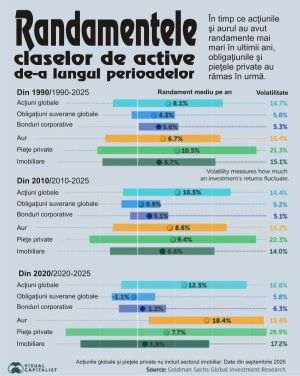2019 could be the year when smaller stock exchanges in the European Union, a category which also includes the Bucharest Stock Exchange, will be officially swallowed by stronger ones, if the European Commission sticks to its plan and succeeds in creating the Union of Capital Markets.
Steven Maijoor, the president of the European Securities and Markets Authority (ESMA), visited Bucharest yesterday, and tried to promote the EU project as a grandiose one which would be beneficial for everybody.
He avoided to give a clear cut answer to the question on the odds of smaller stock exchanges surviving, under the Capital Market Union, but his answers to the repeated questions on this topic do not leave us much hope.
"I think that one of the objectives of the Union is to create a bigger market", said Steven Maijoor, as in the EU, only 20% of the population's savings are invested in the stock market, as opposed to 65% in the USA.
He went on to say: "Those participants that are successful will benefit the most from economies of scale. Of course there could be some changes when it comes to the locations where certain activities take place. For instance, Baltic countries invest a lot in developing clearing and settlement. They are trying to become an area of excellence in that field. The unified market will indeed lead to increased competition, and each local market must ensure it is successful. Even the Romanian market can be successful in this bigger market. Every market must find its niche. It is unclear in advance who will be successful and who won't".
Mr. Maijoor admits that there will be changes in the business imprints of the stock exchanges: "The Union will not preserve the status quo. Subsequently, countries must decide how they are going to be successful. You can't guarantee anyone's success".
The same answer was repeated in various forms.
If in 20 years, the BSE hasn't found its path to success, what are the chances of finding it in the next four years? Nothing of what the management of the Exchange does is conducive towards our optimism.
What happens if an exchange does not want to participate in the Union?
The head of the ESMA does not take that possibility into account: "The feature of the Union is that all of the 28 EU member states participate. The rules that we make apply to everybody. To be honest, I don't think that the markets would want to be left on the outside, because that would mean not to be a part of this bigger market, which comes with all kinds of benefits.
The goal of the European Union is to increase the size of the market, and part of that success is to raise capital from the outside, according to the president of the ESMA, giving the investment funds that have raised capital from Asian investors as an example.
"We hope that, after the union, the non-banking sector will have a greater weight in the financial system, an also that Europe will become a center for attracting capital from other areas of the world", he said. He also said that he wants most households to take stock market investments under consideration, rather than saving through banks.
"They will be forced to do it, because in the long run, yields are higher than they are on deposits", the head of the ESMA said.
According to him, the Union will not involve an integration of the trading platforms nor a centralized tariff capping.
• Steven Maijoor: "When money is very cheap there is the risk of investors becoming too optimistic"
The president of the ESMA estimates that the quantitative easing program of the European Central Bank creates a risk of assets becoming overvalued.
"We see the risk of overvaluation on the stock and debt market, and we remain concerned with these developments", he said.
Steven Maijoor says that the overvaluation of assets is visible in the fact that investors are heading towards less liquid assets, over longer terms.
When asked what measures the overseers took in that regard, the head of the ESMA said: "Regulators on the European markets are there to ensure fair valuation. There are many rules that concern reporting, which should help investors find the correct values.
On the other hand, I have to say that when money is very cheap, and deposits don't earn anything on interest, there is always the risk of investors becoming too optimistic".
As part of the consultations on the creation of the Unified Stock Market, the European Commission has received over 400 comments, including from Romania.
The Deputies from the Budget and Finance Commission said that they want to see a commission cuts and reduced bureaucracy on the capital market.




































